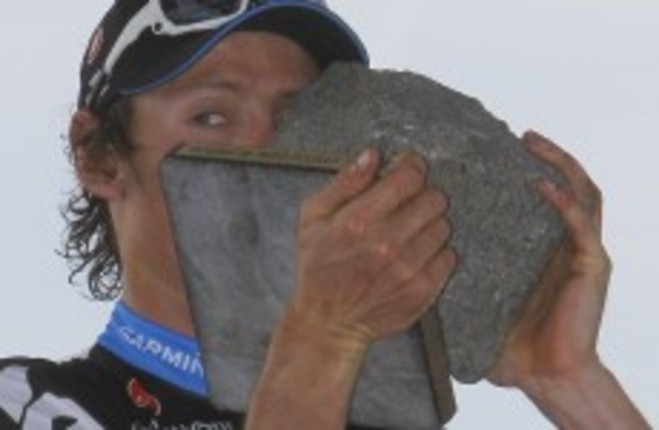THERE WAS A surprise winner of this year’s Paris-Roubaix as Johan van Summeren (Garmin-Cervelo) won the 109th edition of the famous race.
The Belgian reached the Roubaix velodrome alone and finished ahead of Fabian Cancellara (Leopard-Trek) and Maarten Tjallingii (Rabobank) to claim the biggest win of his career.
The race known as the Hell of the North, made famous by it’s unforgiving stretches of cobblestones, was run under dry conditions for the ninth year in a row. But the lack of rain and muck did not prevent a mass of crashes and mechanical mishaps which shaped the race.
One of the major pre-race favourites Tom Boonen (QuickStep) succumbed to such a mechanical in the strategical linchpin of the Arenberg Forest. Boonen was left stranded on the iconic sector of pavé and was forced to wait almost a full minute for a replacement bike to arrive.
Shortly afterward, the unfortunate Boonen was caught behind a crash and would soon abandon the race, the first time the three-time winner has ever failed to reach Roubaix.
Meanwhile, others also hit the deck. Team-mate Sylavin Chavanel fell more than once but soldiered on. British hopes rested firmly on the shoulders of Geraint Thomas (Team Sky), but he tasted dirt on at least three occasions. Filippo Pozzato (Team Katusha) and Bjorn Leukemans (Vacansoleil-DCM) also had their race ruined by crashes.
A large group of approximately 20 riders, containing none of the pre-race favourites, remained clear heading into the final 50km of the race. But the 2011 Paris-Roubaix was defined by attitudes towards defending champion Fabian Cancellara who was in a chase group about a minute behind the leaders. The Swiss power merchant attempted to break from his most serious rivals Thor Hushovd (Garmin-Cervelo), Alessandro Ballan (BMC Racing) and Juan Antonio Flecha (Team Sky), but nobody was willing to work with him to close the gap to the leading group.
Eventually, Cancellara gave up chasing and gesticulated visibly that he wasn’t going to drag his rivals to the finish line so they could beat him in a sprint (not one of Cancellara’s specialities). This let the group that was up the road gain more time. With 15km to go, as the main pre-race favourites marked each other out of contention, Johan van Summeren attacked his breakaway companions and went up the road solo toward the Roubaix velodrome.
Cancellara had no team mates around him and required help with the task in reeling in Van Summeren. World Champion Thor Hushovd is a team-mate of Van Summeren, as such he was entitled not to participate in an organized chase. Others, who did not have team-mates up the road, had no excuse in not helping Cancellara.
With two kilometres to go, Cancellara decided enough was enough and put in a huge attack with which he finally broke away from his main rivals. But it wasn’t enough. Van Summeren crossed the line in the Roubaix velodrome to take the victory that every classics rider dreams of.
Behind, Cancellara was strong enough to catch the remnants of Van Summeren’s breakaway companions and beat them in the sprint for second. Maarten Tjallingii rounded out the podium in third place.
Having been treated to a magnificent Milan San-Remo and a remarkable Tour of Flanders, cycling fans have been spoiled so far this Spring. But this year’s Paris-Roubaix did not disappoint either. Despite the glorious weather, the race displayed crashes galore, fascinating tactics, incredible racing and a surprise winner. Fans would be hard pushed to remember a triumvirate of monument classics as inspiring as what we’ve been treated to this year.
With Johan van Summeren taking the victory, it sees Belgian cyclists taking the victory in all three cobbled classics in 2011, Ghent-Wevelgem (Tom Boonen), the Tour of Flanders (Nick Nuyens) and now Paris-Roubaix. This is the first time these three races have been won by three different Belgians since 1976.
Also, by finishing second, Fabian Cancellara has become the first man since Seán Kelly in 1986 to finish on the podium of the first three monument classics of the season.
It could be argued that the World time trial champion was actually the strongest rider in all three races but he failed to win any of them. The unforgiving domination with which Cancellara achieved the Flanders/Roubaix double last year has worked against him this year as his rivals conspired to ensure he would finish the spring classics empty handed.
Irish champion Matt Brammeier made his debut in the Queen of the Classics as he was a late addition to his HTC-HighRoad team line-up. His appearance signals the first time there has been an Irish interest in the race since twice winner Sean Kelly finished 29th in 1992.
Brammeier’s two goals for the race were to do whatever work he could for the team and to soldier on to Roubaix to finish the race at his first attempt; he managed both. He was visible at the front of the peloton dragging back the breakaway, and he did indeed finish the race, although he ended up too far behind to be attributed an official time.
The classics season continues next weekend with the Amstel Gold race. Along with Fleche Wallonne and Liege-Bastogne-Liege, this race makes up one third of the Ardennes classics. Unlike the cobbled variety, these races are much more suited to smaller, punchier riders. As such, Nicolas Roche, Dan Martin and Philip Deignan should all be present.

